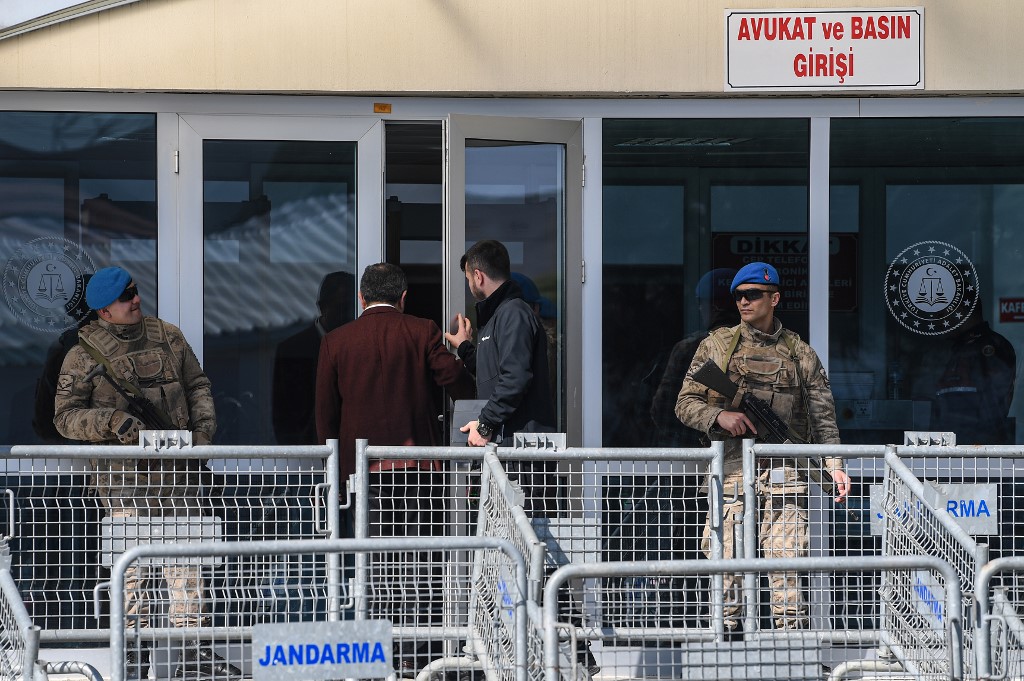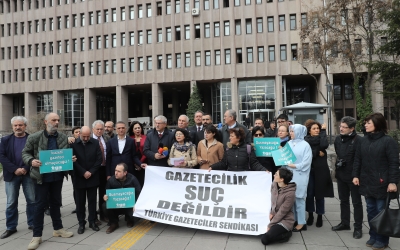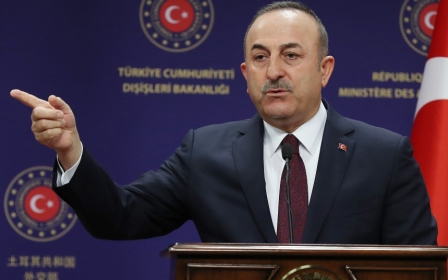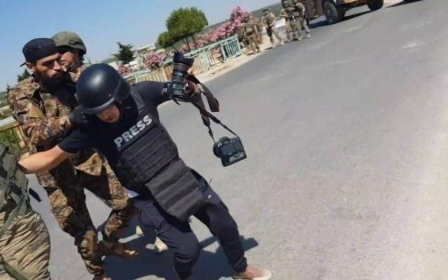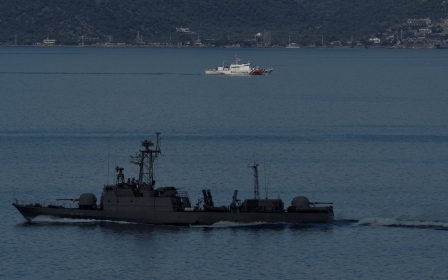Coronavirus: Turkey's political prisoners face 'alarming' conditions, warn rights groups
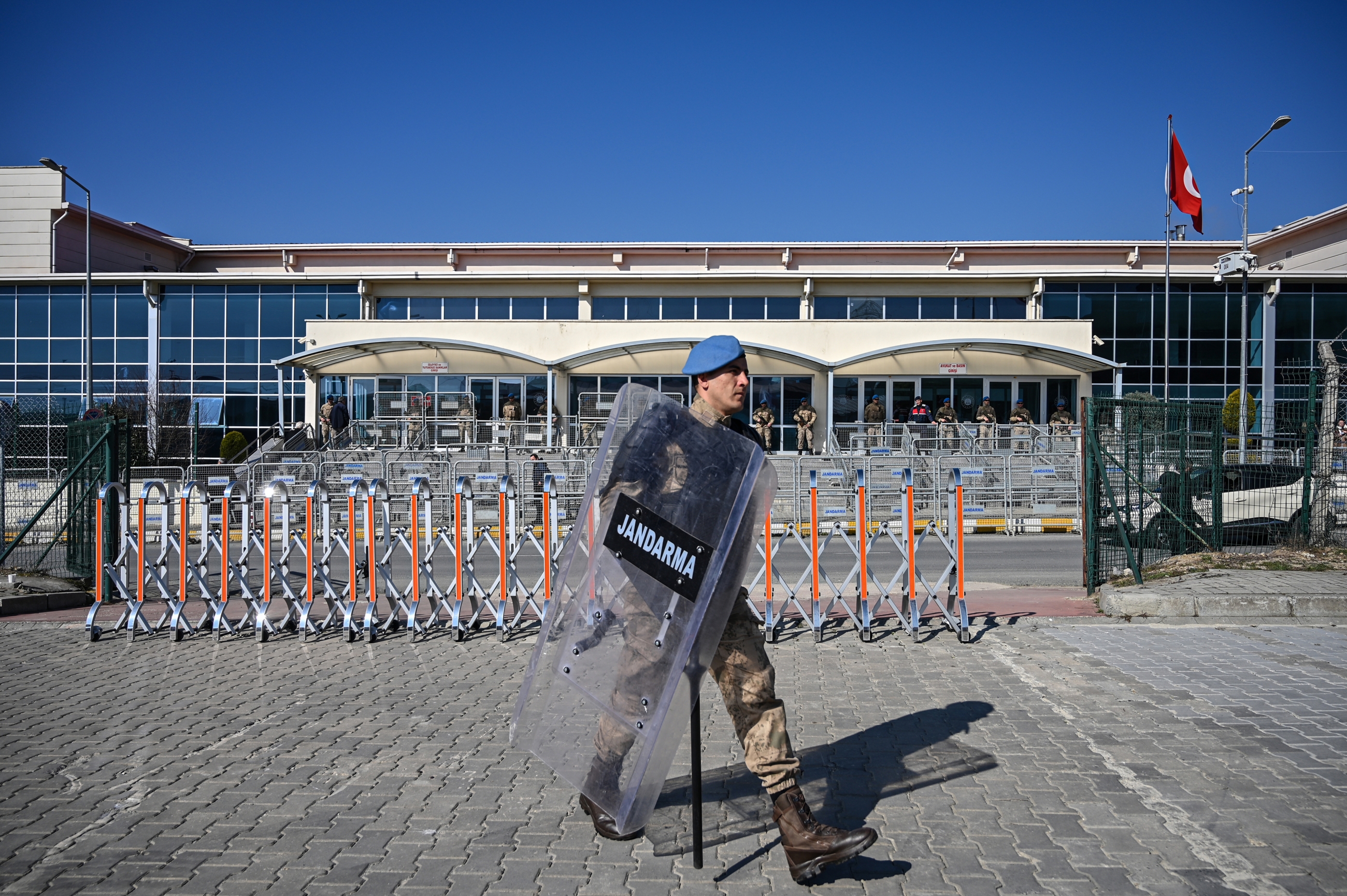
A popular expression in recent years in Turkey, used when someone toys with taking the bold step of criticising the Turkish government, has been "Silivri soguktur simdi", which literally translates as "Silivri is cold now".
Such is the notoriety of Silivri prison, particularly as a jail for politicians, activists and journalists, that it is now used sardonically as a byword for the fate of those who risk the ire of the Turkish establishment.
Among the most famous figures currently locked up in the sprawling complex - currently the largest penal facility in Europe - are Osman Kavala, the activist and philanthropist, writer and journalist Ahmet Altan, prominent OdaTV journalists Baris Terkoglu and Baris Pehlivan, and many more.
'The prisoners stated that their access to healthcare was quite limited, even for those who were showing symptoms of the disease'
- Human Rights Association
Their detention has long troubled opposition politicians and human rights organisations, who now are becoming increasingly alarmed by the spread of the coronavirus pandemic in the prison, with one death from Covid-19 officially confirmed on 22 May.
A new report by a group of Turkish human rights organisations, following a rare visit to the prison, has warned that conditions in the facility were worrying amid the pandemic.
New MEE newsletter: Jerusalem Dispatch
Sign up to get the latest insights and analysis on Israel-Palestine, alongside Turkey Unpacked and other MEE newsletters
"The prison director indicated that 107 inmates in Silivri Prison No. 7 tested positive for coronavirus and some wards (15 according to the prison staff) were quarantined," the Human Rights Association (IHD) said in a statement to Middle East Eye, referring to one of the centres within the complex where the outbreak has been localised.
"The delegation also met with prisoners and stated that the overcapacity, lack of hygienic material, and poor material conditions of the prison were alarming within the context of Covid-19.
"The prisoners stated that their access to healthcare was quite limited, even for those who were showing symptoms of the disease. In addition, the fact that the number of wardens was limited, preventing due care and attention in the facility."
Repeated warnings have been made in Turkey about the risk of coronavirus spreading in prisons.
In April, the government appeared to heed these concerns and released almost 100,000 inmates in an attempt to prevent overcrowding and the spread of the disease.
'Political prisoners have been almost left to die, as if designated as prey. And this led to Covid-19 cases being observed in them'
- Omer Faruk Gergerlioglu, HDP MP
However, the move was heavily criticised by many activists and politicians for allowing the release of numerous career criminals - including one notorious far-right mob boss - while leaving political prisoners incarcerated.
Omer Faruk Gergerlioglu, a doctor and MP with the opposition Peoples' Democracy Party (HDP) told Middle East Eye that the government's treatment of these prisoners had been contemptuous.
"Political prisoners have been almost left to die, as if designated as prey. And this led to Covid-19 cases being observed in them," he said.
"If these individuals had been fairly tried, they would never have gotten infected with coronavirus in the first place, and in some cases, not have died."
'Riskiest situations'
There have long been concerns in Turkey about conditions in the country's prisons.
The IHD and others have for many years campaigned on the issue of chronically or terminally ill inmates and the failure of prison authorities to provide medical treatment or arrange for their release.
According to statistics released by the health ministry, highlighted by the IHD and other human rights organisations in 2011 as part of their campaign, 913 convicts died of disease in Turkish prisons between 2000 and 2010.
The groups cited a chronic lack of health teams and medical equipment, and the late diagnosis and treatment of sick prisoners as underlying causes in many of the deaths.
Since the 2016 July coup attempt, Turkey's prison population has vastly increased. As of January 2019, there were 30,947 people in prison on charges linked to either terrorism or the coup attempt.
The explosion of the coronavirus pandemic in February has provoked crises in prisons across the globe, with a number erupting into outright revolt over mistreatment and denial of visitation rights.
In Turkey, activists and prisoners' relatives have complained of a lack of transparency over the extent of the outbreak, which they claim is much worse than the government has disclosed.
Justice Minister Abdulhamit Gul said in a statement in late April that 120 inmates from four separate prisons had been infected with the virus. Since then, there has been little or no more information given.
"The government, the Ministry of Justice and the prosecutors are not telling the truth ... they are in a race to not be transparent, and to give incomplete information," said Gergerlioglu.
"The Ministry of Justice has made two short statements and reported cases and deaths. But they hesitated to say even in which prisons those cases were seen."
In his April statement, Gul said that every "arrestee and convict is given cleaning and hygiene products regularly and free of charge" and said wards were thoroughly cleaned.
But Amnesty International has warned that families were receiving information from their imprisoned relatives that hygiene in the complexes was severely lacking.
Andrew Gardner, senior Turkey researcher for Amnesty, told MEE that overcrowding and poor hygiene were still endemic.
The Ministry of Justice has indicated what measures have been taken, but unfortunately speaking to relatives and others it seems clear that in certain prisons the effective measures haven’t been taken
- Andrew Gardner, Amnesty
“The Ministry of Justice has indicated what measures have been taken, but unfortunately speaking to relatives and others it seems clear that in certain prisons the effective measures haven’t been taken," he said.
He said that high security prisons were currently seeing the "riskiest situations". Despite Gul's promises, prisoners were reportedly still not getting access to cleaning products or having their cells disinfected.
In addition, wardens were said to be quarantining together those suspected of infection in severely overcrowded conditions.
"Prisons like Silivri are where people have been prosecuted under anti-terrorism laws, and therefore they won’t have had prisoners released from them," said Gardner.
“Obviously the concern is that people who feel that they have been unfairly imprisoned in the first place, and that have been subjected to politically motivated prosecutions, don’t have any confidence at all that the authorities are looking after their welfare when they’re in prison.”
Another factor exacerbating the problem is Turkey's use of pre-trial detention.
Around 43 percent of Turkey's prison population is made up of those in pre-trial detention, according to statistics from the Ministry of Justice.
In normal times, those held in pre-trial detention would be able to argue the case for their release in court. However, coronavirus has paralysed the courts system and bureaucracy in Turkey.
Combined with the fact that the April release law only applies to those already convicted, people held in pre-trial detention are being kept in prison without convictions and left exposed to the virus.
Perhaps the most seriously affected by the seizing up of the bureaucracy are those suffering from terminal and chronic illnesses, a long-running issue which has been worsened by the pandemic.
Gergerlioglu said that the lockdown had meant that those applying for release due to serious illness were not able to have their cases heard.
"Cancer patients could not appear before boards of health and these boards could not convene for months," he said, adding that these people had effectively become the "most victimised group" in prisons as a result.
"Their risks were greater than the other persons, as sick and elderly ones die faster as is the situation in the society in general," he said. "There are many sick and elderly inmates in prisons. Their passing would amount to a major crime and sin."
'Panic and fear'
According to the latest statistics released by the Turkish health ministry on Wednesday, the country's Covid-19 death toll reached 4,746 with a total of 173,036 cases, placing it 17th place in the global rankings of deaths from the pandemic.
Though the country is far from the worst affected by the coronavirus catastrophe - compared with Western Europe or the US - and has been praised for its relatively low death rate, many have been left concerned by what some see as an instinct towards opaqueness on the part of the government.
On Wednesday, Human Rights Watch criticised the Turkish authorities for launching investigations into the heads of three health associations over their questioning of both the government's handling of the pandemic and the veracity of the statistics released on infections.
A court in the southeastern province of Sanlıurfa on 4 May imposed a travel ban on Osman Yuksekyayla, general secretary of the Sanliurfa Medical Chamber, as well as co-chair Omer Melik, and ordered them to sign in with their local police stations while a criminal investigation is completed.
The local prosecutor said they were accused of issuing “content that causes panic and fear among the public" with regards to the release of figures, social media posts and interviews related to the pandemic.
High profile doctors in Van and Mardin have been subjected to similar treatment, while an atmosphere of self-censorship has become pervasive around health workers, according to HRW.
Silivri may not be so cold in June, but health workers, politicians and activists are still wary of the state's hand when it comes to questioning the government's handling of the coronavirus crisis.
Middle East Eye delivers independent and unrivalled coverage and analysis of the Middle East, North Africa and beyond. To learn more about republishing this content and the associated fees, please fill out this form. More about MEE can be found here.


